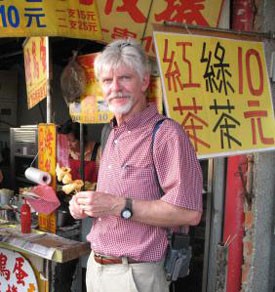Developing world educators

Terry Smith has long been dedicated to teachers.
Whether it's preparing Radford University students for careers as classroom educators or guiding current teachers through avenues of professional development, Smith is passionate and persistent in providing both groups access to a world of resources.
If you need proof, take a look at the two online collaboration projects – the Monster Project and Landmark Games – he runs each year. Both bring together classrooms from all over the United States as well such faraway countries as – to name a few – Russia, England, Taiwan and Argentina.
A few years ago, when National Geographic began an effort to select education professionals who could help the media company connect teachers throughout the world through online communities, Smith was a natural selection to join the group.
He was one of eight selected as The Voices of Geo-Education.
"National Geographic was looking for a way to involve more teachers in what the organization does, and more teachers are using the resources of the world by using National Geographic resources to teach in the classrooms," said Smith, an assistant professor in RU's School of Teacher Education and Leadership. "It was an effort to get teachers where they want to be and maybe take their eyes off the tests for a while. Also, teachers can use these resources from National Geographic, which has amazing video clips and lessons and software teachers can all use."
The first task for the eight educators was to organize the National Geographic Educator Community website and to create a global bank of Internet projects, like the Monster Project. Next, they searched out exemplary K-12 teachers who were already "connecting with other schools, using maps and globes and were environmentally connected to the world," Smith said.
The efforts, which took about a year, led to the creation of a teacher certification program.
The three-part program offers free training and requires K-12 teaching professionals to share lesson ideas with other educators, develop and run a classroom project in which they use four or five different software tools, such as Google Earth and Mapmaker Interactive, and then create a two-minute video demonstrating their involvement.
Teachers must also follow a framework called ASK, an acronym for Attitudes, Skills and Knowledge.
"Teachers must show how they supported that framework by recording their students' attitudes about the world, and then how they had their students immersed in skills of using different kinds of tools and then how their students gained knowledge from the projects," explained Smith, who serves as a trainer for the program.
The program is important to teachers because it provides them a connection to other National Geographic-certified teachers. They connect through online groups to communicate and share videos, lesson plans and various other resources.
There's also the Grosvenor Teacher Fellow program, which recognizes exemplary educators for their commitment to geographic education and gives them an opportunity to travel abroad with other selected fellows.
"We have an amazing group of professional development going on where the educators connect with one another," said Smith, a former elementary school teacher. "They share their work online and eventually we see more and more them become Grosvenor fellows.
So far, the certification program is not open to pre-service teachers, but Smith is working to reverse that restriction. "We are talking about how we can certify pre-service teachers and keep the program authentic," said Smith, who also is looking to bringing a training session to the Radford University campus.
In one instance, however, Smith was able to gain an exception for a Radford student, Liz Andrus, who stepped in and helped him at a conference deliver an important presentation about Mapmaker Interactive.
"She practiced, learned and did everything," Smith said of Andrus. "She presented to other teachers about how the program works and did a wonderful job."
Andrus, a graduate student in RU's Elementary Education Curriculum and Instructor master's program, said she had only a few weeks to learn the program, a "nerve-racking" experience, she said.
It was worth it.
Being certified as an educator by the prestigious magazine she grew up reading is "a great feeling," the Stuarts Draft native said. "The National Geographic framework has become a huge part of my own teaching philosophy."
After the experience, Andrus inquired about getting certified though the program. "She emailed me and said, ‘I know this program pretty well. Is there any way I can get certified?'"
Smith then he checked into gaining an exception for the exceptional student.
It worked.
"And now, she's the only pre-service teacher certified with the program," Smith said.